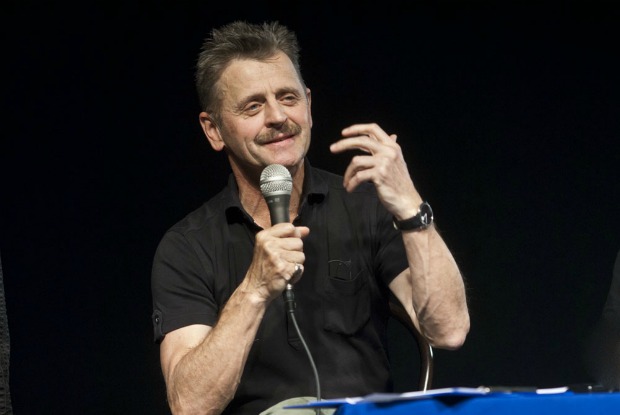Yesterday morning, me and about 40 other journalists packed into the Yaron Yerushalmi Theater at the Suzanne Dellal Center. Naturally, the writers and photographers bickered over who was blocking whose sightline. Everyone wanted to get as good a look as possible at the stage. It was as if Elvis was about to walk in. At least for me it was. And then, without too much fuss, Mikhail Baryshnikov popped onto the stage, flanked by famed director Dmitry Krymov, CEO of Suzanne Dellal Yair Vardi and a Russian/Hebrew translator. Tomorrow night, Baryshnikov will take the stage at the downtown dance center for the first of eight performances. The catch is that the legendary dancer is here as an actor in Krymov’s interpretation of Ivan Bunin’s 12-page story In Paris, not to do pirhouettes and jumps.
I was stuck somewhere between the 19-year-old reporter from I-don’t-know-where, who was making eyes at Baryshnikov, and Israel’s entire staff of Russian journalists. The performances will be delivered in Russian with Hebrew subtitles, a decision made by Krymov to maintain authenticity. The session opened with questions from the crowd, as Krymov preferred to let the play speak for itself.
It began with some simple questions about the show, which tells the tale of two Russian immigrants who meet in post-war Paris and fall in love. Is the overall theme nostalgia? Does it connect to the super nostalgic ballet Baryshnikov performed during his visit two years ago? How did Krymov manage to turn 12 pages into 90 minutes?
And then, without skipping a beat, the crowd did away with the trivial matter of the performance and hit Baryshnikov with a spray of questions about his thoughts on Israel, our women, politics, cities and dance scene.
It began sweetly, with the pretty, young representative of IDF Radio, clad in her green uniform, asking the question we all knew was going to be asked. “Were you pressured not to come here?” she called out from the side of the auditorium. A stifled giggle went through the room. It had to be asked, I guess. At least, it was asked two years ago at Baryshnikov’s last press conference. “No” he answered.
But then the obsessive need to hear positive feedback about the country prevailed. On and on the journalists asked Baryshnikov if he likes it here, how long he’ll stay, does he like Jerusalem, will he come back, are the people nice, are we good artists here, blah blah blah. It was almost embarrassing. It was as if they were deaf to anything that didn’t have to do with Israel. No one cared any more about In Paris or Krymov, who sat silently rotating his water bottle in his hands. All they cared about was if Baryshnikov likes us. And though he kept saying that he does like us and that he doesn’t like to deal with politics, it wasn’t enough. We were like high school girls, desperate for love and acceptance.
In the midst of the madness, I did get to ask the question I had been too nervous to ask last time. It was this: Does Baryshnikov have a pre-performance ritual? The answer was yes. He is a very nervous performer, he divulged. He likes to arrive 3-4 hours before the show and walk around the stage, trying to warm up and breathing. Though the question got swallowed alive by the wannabe patriotic tone in the room, I was pleased. I got what I came for.

